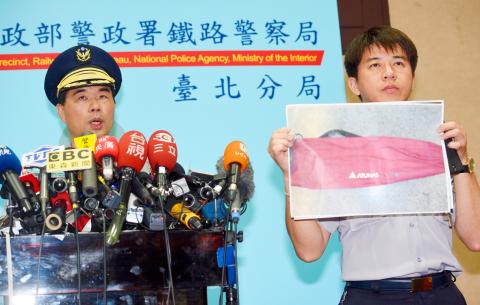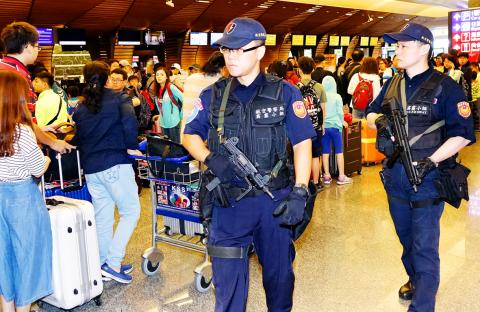Authorities yesterday said they have identified a suspect in Thursday’s Taipei train explosion, adding that preliminary findings have ruled out a terror attack.
The explosion, which occurred at about 10pm on Thursday in the sixth carriage of a commuter train as it headed into Songshan Railway Station (松山車站), injured 25 passengers.
Office of Homeland Security officials mobilized at the Songshan Railway Station to assist in the investigation.

Photo provided by Taiwan Railways Administration
After visiting the victims in hospital yesterday, Premier Lin Chuan (林全) said that initial findings indicated the explosion was a “malicious incident.”
“It was not an organized attack, but a major breach of public security by one individual,” he said, adding that he has asked authorities to get to the bottom of the case.
Sources cited three reasons for the government to discount links to terrorist organizations: information provided by the National Security Bureau showed there was no claim of responsibility by an organization or an individual; there also was no intelligence from at home or abroad to indicate international terrorists were entering Taiwan, nor were there indications of local terrorist cells operating within the nation; and the bomb was a small device that fits the pattern of ordinary criminal activities.

Photo: Lo Pei-der, Taipei Times
Investigators from the National Police Agency’s Criminal Investigation Bureau (CIB) worked through the night to examine the evidence and gather fingerprints at the carriage explosion site, including broken metal canister sections, along with a bag containing tools and tapes thought to have been left by the suspect.
Investigators said the device was a crudely made homemade pipe bomb, which suggested the suspect had learned how to make it from instructions on the Internet.
Witnesses said they saw a fireball following a loud explosion, then smoke filled the carriage, with many passengers sustaining burns and cuts, before receiving first aid and being rushed to hospitals for further treatment.

Photo: Chu Pei-hsiung, Taipei Times
After an initial investigation, the police yesterday identified Lin Ying-chang (林英昌) — one of six people who were seriously injured — as the probable suspect.
Lin Ying-chang, a 55-year-old resident of New Taipei City with prior convictions for minor crimes, is in intensive care and is unable to speak for the time being, the police said, adding that further investigation is needed to identify a motive.
After speaking with several witnesses to the explosion and collecting and analyzing the evidence on the scene, police said Lin Ying-chang, who was divorced and worked as a house painter and did various manual odd jobs, was believed to be holding the bomb when it went off.
The explosive device, which was a 47cm-long pipe bomb, was broken in two by the explosion, with one part found on the train by investigators, and the other found later on the tracks, a senior CIB forensics official told a news conference at 6pm.
CIB investigators found that the steel tube would have been able to contain between 500g and 1,000g of gunpowder, the forensics official said.
Wang Pao-chang (王寶章), chief of the Railway Police Bureau’s Taipei branch, told the news conference that it was likely the bomb had detonated by accident, as Lin Ying-chang allegedly assembled the materials in the washroom at the end of the carriage, based on witnesses who later identified Lin Ying-chang carrying the metal canister and said he was acting strangely.
“The fingerprints and DNA from Lin [Ying-chang] also matched those found on what was left of the bomb device and the tools,” Wang added.
CIB Forensic Examination Division head Yeh Chia-yu (葉家瑜) presented other evidence, including photographs of Lin Ying-chang’s blood-soaked, torn clothing, which indicated he sustained burns to his chest, limbs and groin, apparently from a direct blast impact at close distance, which were consistent with witness accounts of Lin carrying the canister device when it exploded.
Police have contacted Lin Ying-chang’s son and his ex-wife for questioning, and found an abandoned car in Nantou County, which they believe was left by Lin before he went to Taipei on Thursday.
Presidential Office spokesman Alex Huang (黃重諺) said the National Security Council has left the investigation after relevant government agencies ruled out terrorism.
Huang said the council immediately initiated a contingency response mechanism after the blast.
“In addition to maintaining close contact with the National Security Bureau and the Executive Yuan’s Office of Homeland Security to grasp the latest development, the council’s deputy secretaries-general and relevant officials had stayed at the council since the blast,” Huang said, adding that the council briefed President Tsai Ing-wen (蔡英文) regularly on the latest developments.
Additional reporting by Stacy Hsu and CNA

LONG FLIGHT: The jets would be flown by US pilots, with Taiwanese copilots in the two-seat F-16D variant to help familiarize them with the aircraft, the source said The US is expected to fly 10 Lockheed Martin F-16C/D Block 70/72 jets to Taiwan over the coming months to fulfill a long-awaited order of 66 aircraft, a defense official said yesterday. Word that the first batch of the jets would be delivered soon was welcome news to Taiwan, which has become concerned about delays in the delivery of US arms amid rising military tensions with China. Speaking on condition of anonymity, the official said the initial tranche of the nation’s F-16s are rolling off assembly lines in the US and would be flown under their own power to Taiwan by way

CHIP WAR: The new restrictions are expected to cut off China’s access to Taiwan’s technologies, materials and equipment essential to building AI semiconductors Taiwan has blacklisted Huawei Technologies Co (華為) and Semiconductor Manufacturing International Corp (SMIC, 中芯), dealing another major blow to the two companies spearheading China’s efforts to develop cutting-edge artificial intelligence (AI) chip technologies. The Ministry of Economic Affairs’ International Trade Administration has included Huawei, SMIC and several of their subsidiaries in an update of its so-called strategic high-tech commodities entity list, the latest version on its Web site showed on Saturday. It did not publicly announce the change. Other entities on the list include organizations such as the Taliban and al-Qaeda, as well as companies in China, Iran and elsewhere. Local companies need

CRITICISM: It is generally accepted that the Straits Forum is a CCP ‘united front’ platform, and anyone attending should maintain Taiwan’s dignity, the council said The Mainland Affairs Council (MAC) yesterday said it deeply regrets that former president Ma Ying-jeou (馬英九) echoed the Chinese Communist Party’s (CCP) “one China” principle and “united front” tactics by telling the Straits Forum that Taiwanese yearn for both sides of the Taiwan Strait to move toward “peace” and “integration.” The 17th annual Straits Forum yesterday opened in Xiamen, China, and while the Chinese Nationalist Party’s (KMT) local government heads were absent for the first time in 17 years, Ma attended the forum as “former KMT chairperson” and met with Chinese People’s Political Consultative Conference Chairman Wang Huning (王滬寧). Wang

CROSS-STRAIT: The MAC said it barred the Chinese officials from attending an event, because they failed to provide guarantees that Taiwan would be treated with respect The Mainland Affairs Council (MAC) on Friday night defended its decision to bar Chinese officials and tourism representatives from attending a tourism event in Taipei next month, citing the unsafe conditions for Taiwanese in China. The Taipei International Summer Travel Expo, organized by the Taiwan Tourism Exchange Association, is to run from July 18 to 21. China’s Taiwan Affairs Office spokeswoman Zhu Fenglian (朱鳳蓮) on Friday said that representatives from China’s travel industry were excluded from the expo. The Democratic Progressive Party government is obstructing cross-strait tourism exchange in a vain attempt to ignore the mainstream support for peaceful development